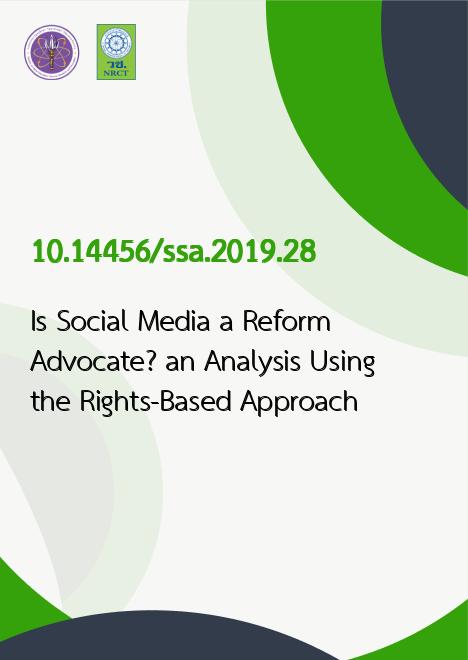
|
Is Social Media a Reform Advocate? an Analysis Using the Rights-Based Approach |
|---|---|
| รหัสดีโอไอ | |
| Creator | Marizel M. Go |
| Title | Is Social Media a Reform Advocate? an Analysis Using the Rights-Based Approach |
| Publisher | National Research Council of Thailand |
| Publication Year | 2562 |
| Journal Title | SOCIAL SCIENCE ASIA : Official Journal of National Research Council of Thailand in conjunction with Journal of Politics and Governance |
| Journal Vol. | 5 |
| Journal No. | 4 |
| Page no. | 59-69 |
| Keyword | Social Media, Reform, ICT, Inequality, Protest |
| URL Website | http://e-journal.nrct.go.th/ |
| Website title | e-journal |
| ISSN | 2229-2608 |
| Abstract | The world is becoming increasingly connected through the power of the Internet. The creation of websites was an innovative advancement in technology that has afforded information and communication technologies (ICTs) special recognition as a means to improve people's lives. Such technology has brought to life what are known as social networking services. These services, better known as social media, are increasingly attracting the attention of both the public and academic researchers intrigued by their utilization and reach. On 26 August 2013, the Filipino people made history by using social media to organize the "Million People March", a protest calling for the abolition of the pork barrel government system and for the prosecution of those that abused it. The "Occupy Wall Street" movement of 2011, known for non-violent protest of the growing income disparity and economic inequality attributed to Wall Street's corporate executives, was organized on social media and carried out in New York City. In the same year, the democratic uprising known as the "Arab Spring" highlighted the effective use of social media to organize, communicate, and raise awareness of State attempts at repression and Internet censorship. An increasing number of studies are examining these phenomena, however comparative studies of the results of these events remains limited. In an attempt to fill this gap, this study focuses on the success and the outcomes of these movements that made use of social media. This paper will shed light on the role of social media in advocating for governmental reforms. |